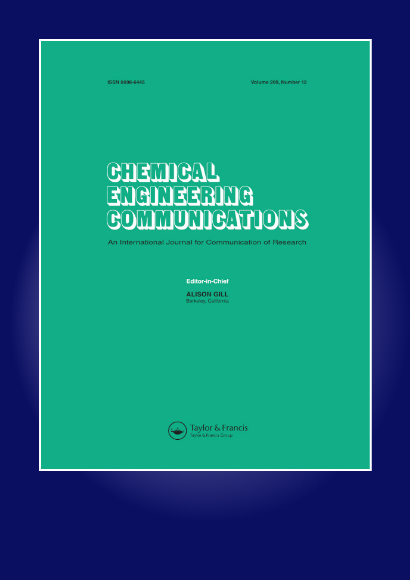Simulation of fluid flow and heat-moisture transfer mechanism in packed bed based on double-diffusion model
IF 1.9
4区 工程技术
Q3 ENGINEERING, CHEMICAL
引用次数: 0
Abstract
AbstractBased on the discrete element method (DEM), four packed beds composed of soybean kernels with diameters of 6.4, 6.8, 7.4 mm, and the mixture of three kinds of particles were established. Then, a double-diffusion heat and mass transfer model between the grain pile and the interstitial air was established based on the local mass and thermal non-equilibrium (LMTNE) mechanism. Finally, employing particle-resolved computational fluid dynamics (PRCFD), the heat and mass transfer between the grain kernels and air during the drying process in the four packed beds were numerically resolved. It was found that the packed bed formed by stacking particles of different diameters had a minimum porosity of 0.4547. The radial porosity of the packed bed oscillates and decreases toward the central axis, while the tortuosity of the airflow path oscillates and decays toward the periphery. The mass transfer Biot number for soybean kernels with diameters of 6.4, 6.8, and 7.4 mm were 2.38 × 106, 2.44 × 106, and 2.53 × 106, respectively. This indicates that the mass transfer rate in the grain pile primarily depends on the magnitude of the moisture diffusion coefficient within the grain kernels. Compared with mass diffusion, thermal diffusion occurs much faster, which results in temperature gradients in packed beds only existing in the first 5 min of drying, and the drying rate in the early stage is higher than that in the later stage. Most importantly, the airflow characteristics, heat and moisture content are not in local equilibrium in the packed bed, and should be considered when designing drying systems.Keywords: Biot numberdouble-diffusionheat-moisture coupling transferporositysoybeantortuosity Disclosure statementThe authors declare that they have no conflicts of interest.Additional informationFundingThis study was supported by the Scientific and Technological Innovation Project for Youth of Shandong Provincial Colleges and Universities (Grant No. 2019KJH012). The Plan of Guidance and Cultivation for Young Innovative Talents of Shandong Provincial Colleges and Universities.基于双扩散模型的填料床流体流动及热湿传递机理模拟
摘要基于离散元法(DEM),建立了直径分别为6.4、6.8、7.4 mm的大豆籽粒和3种颗粒混合组成的4个填充床。然后,基于局部质热不平衡(LMTNE)机理,建立了颗粒堆与间隙空气之间的双扩散传热传质模型。最后,利用粒子解析计算流体力学(PRCFD)对四层填料床干燥过程中籽粒与空气之间的传热传质进行了数值解析。结果表明,不同粒径颗粒堆积形成的充填床孔隙率最小为0.4547。充填床的径向孔隙率沿中心轴方向振荡减小,而气流路径的弯曲度沿外围方向振荡衰减。直径为6.4、6.8和7.4 mm的大豆籽粒传质Biot值分别为2.38 × 106、2.44 × 106和2.53 × 106。这表明谷粒堆内的传质速率主要取决于谷粒内水分扩散系数的大小。与质量扩散相比,热扩散发生的速度要快得多,这导致充填床内的温度梯度只存在于干燥前5 min,且干燥初期的干燥速率高于后期。最重要的是,填料床内的气流特性、热量和水分含量不处于局部平衡状态,在设计干燥系统时应予以考虑。关键词:生物数字双扩散-热-湿耦合转移孔隙率化学扭曲性公开声明作者声明无利益冲突。本研究由山东省高校青年科技创新项目(批准号:2019KJH012)资助。山东省省级高校青年创新人才引导培养计划。
本文章由计算机程序翻译,如有差异,请以英文原文为准。
求助全文
约1分钟内获得全文
求助全文
来源期刊

Chemical Engineering Communications
工程技术-工程:化工
CiteScore
5.50
自引率
4.00%
发文量
80
审稿时长
6 months
期刊介绍:
Chemical Engineering Communications provides a forum for the publication of manuscripts reporting on results of both basic and applied research in all areas of chemical engineering. The journal''s audience includes researchers and practitioners in academia, industry, and government.
Chemical Engineering Communications publishes full-length research articles dealing with completed research projects on subjects such as experimentation (both techniques and data) and new theoretical models. Critical review papers reporting on the current state of the art in topical areas of chemical engineering are also welcome; submission of these is strongly encouraged.
 求助内容:
求助内容: 应助结果提醒方式:
应助结果提醒方式:


